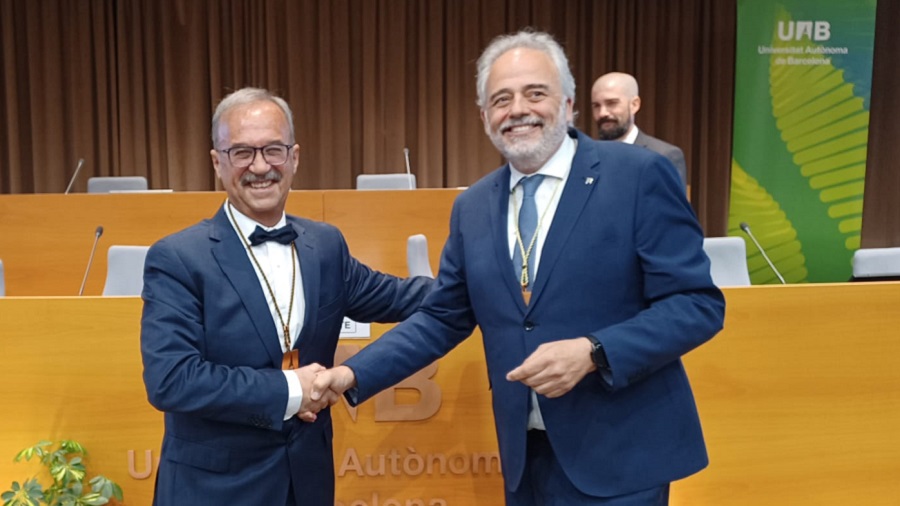The UAB honours Juan Manuel Lema's "leadership in training research groups"
Rector Javier Lafuente showed his appreciation for the "leadership in training consolidated and competitive research groups" and the "generosity when building communities, sharing knowledge and training researchers" of Juan Manuel Lema, emeritus professor of Chemical Engineering at the University of Santiago de Compostela (USC) and president of the Galician Royal Academy of Science, in a ceremony in which he was awarded an honorary doctorate by the UAB after being proposed by the School of Engineering. Lema’s sponsor, Juan Antonio Baeza, praised both his value as a person and his academic trajectory, highlighting his central role, "alongside Professor Carles Solà, in focusing on research in environmental engineering and in biological engineering" at the UAB, which created "the first Department of Chemical Engineering in Spain to have this specialisation".

Rector Lafuente, as a professor of Chemical Engineering himself, explained that this award has "a very important personal meaning" since he had the honour of being "witness and participant of the excitement of creating the new department". He assured the audience that, "the tenaciousness and persistence of Dr Lema—and Dr Solà—was essential in introducing this emerging research field in our country". He ended his speech affirming that "his reflective and kind carácter, rigorousness and his example in defending the idea of a university profoundly committed to advancements in science and progress for society represent an example and an inspiration for the UAB".
From Biochemical Engineering to Biological Engineering
In his master lecture, Dr Lema reviewed his career at the UAB and USC, marked by the implementation and development of biochemical engineering, a concept that "first appeared in the late 1940s", and called for a more holistic name that includes "a much broader vision of the problems considered": biological engineering. He mentioned both the establishment of the field of chemical engineering at the UAB and the development of the discipline at the USC, where Dr Lema promoted the creation of the Environmental and Process Biotechnology Group (Biogroup) and the Cross-disciplinary Research in Environmental Technologies (CRETUS). He congratulated himself for having focused from the outset on issues "that were emerging at international level and which have developed so much over the years". It fills me with happiness," he said, "to see the great personal and professional developments" of the research groups with which he has worked both at the UAB and in Santiago.
As for the UAB, he referred to the evolution of the Department of Chemical, Biological and Environmental Engineering, and praised the introduction in 2002 of the first degree in Biotechnology in Spain. Looking to the future, Dr Lema suggested the creation of a degree in biological engineering at the UAB "which would be new in the university world", and would be "a distinctive sign" for the institution and "would cover an important demand in the field of research and production in the fields of pharmaceutical compounds, food, biofuels, etc.".
The new honorary doctor also evoked the experience of joining the UAB when the institution had not yet been in existence for ten years. “I discovered," he said, "that I could contribute, with my opinions and initiatives, to the creation of that new, freer, more democratic and more professional university that we all longed for". And he described the impact of the UAB on his life: "It is the university where I grew up, the one that has most influenced my professional life. Together with my beloved USC, they are the universities from which I have received the most and to which I have tried to contribute everything I could". He concluded his speech by summarising the "three keys" that he considers "important for the development of a scientific career": enthusiasm, commitment and the team.
The UAB, with Sustainable Development Goals
Affordable and clean energy
Quality education
Responsible consumption and production
Sustainable cities and communities
Clean water and sanitation